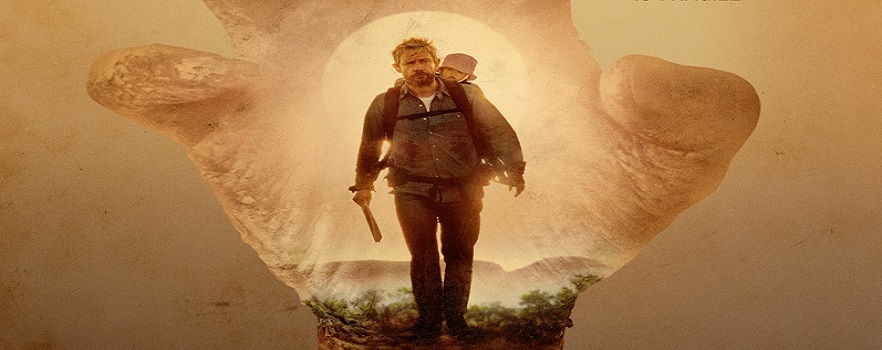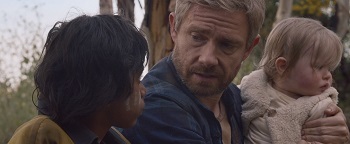Cargo Almost Pulls its Own Weight

Cargo begins with so much potential. A zombie plague. A family struggling to survive. The wilds of rural Australia. A top-notch cast to bring it to life. It packs a real emotional punch inside a small story. And then…it loses momentum and falls back on several common stereotypes and sentiment to fill in the gaps. Cargo is a good movie, but it should have been better.
Some small spoilers ahead
Set in an Australia ravaged by a zombie-creating virus, Andy, Kay, and their infant daughter Rosie, are struggling to find a safe haven from the end of the world. When Kay is attacked and infected they must change their plans to get her help. But she turns, attacks, and infects Andy before they find any, and he is left alone to save Rosie before he also turns into the undead.
Martin Freeman is his sincere, exceptional self as Andy, a man out of his element and trying to keep his family alive. Suzie Porter is a great match as his wife Kay, strong and determined and brave in the face of inevitable disaster. And newcomer Simone Landers is completely convincing as Thoomi, the young Aboriginal girl trying desperately to save her own father before she joins up with Andy and Rosie.
The small cast is filled out by Bruce R. Carter and Natasha Wanganeen as Thoomi’s parents, and David Gulpilil as the tribal elder Daku–the Clever Man. Kris McQuade, Anthony Hayes and Caren Pistorius are other struggling survivors.
Cargo is all about family
Cargo is not actually scary–the effect it produces is more unsettling and sad, with some very striking monster reveals. But as an addition to the already-loaded zombie genre it works, and works pretty well.
Some of the strongest scenes in the movie are the early ones between Andy and his wife, as they struggle to make increasingly urgent life and death decisions, first as healthy humans and then as infected pre-zombies. The later development of a family bond between Andy and Thoomi is also surprisingly touching and believable, if at times throwing a heartbreaking amount of emotional weight onto the child.
Cargo also chooses to touch on major social issues like racism, funding cuts to resources in aboriginal areas, and environmental concerns about fracking. Given the characters involved, it makes sense to be aware of the issues even if they are not dealt with in depth. There is, after all, a zombie apocalypse going on.
However, the other side of acknowledging the issues is turning them into cliched plot devices. The racist, survivalist gas-line worker and the Aborigines shown as noble savages are reduced to stereotypes, and cheapen an otherwise compelling plot.
And another thing…
Unfortunately, with such a small cast and limited focus, Cargo’s 105 minutes prove too long to spend on telling the story. In between genuine character development and forward plot motion, the pacing lags. There are too many long shots of Andy trudging through the outback with his daughter strapped to his back and slow-motion scenes of Aboriginal warriors destroying the undead. While the scenery is beautiful, less of would have been enough.
But there are also some wonderful details.
The government-issue medical kits are a great, grim touch, with their basic fact sheet, wristband timer, mouthguard, cuffs, and spring-loaded spike for ending it all. The variations on the old zombie theme are bizarre and intriguing, with the copious, sticky pus and the need to hibernate in the dark. And the carrot and stick trick is brilliant, if a bit overwrought at the end.
Carrying on
The real strength of Cargo is the intimate drama of it, and the 2013 short Cargo was based on was as tightly put together as anyone could wish. Stretching it to feature length required some padding and diluted the raw power of a man’s determination to save his child. In the end Cargo is a movie that, while beautifully made and touchingly acted, ends up being less than it should be because it thought it needed to be more.


